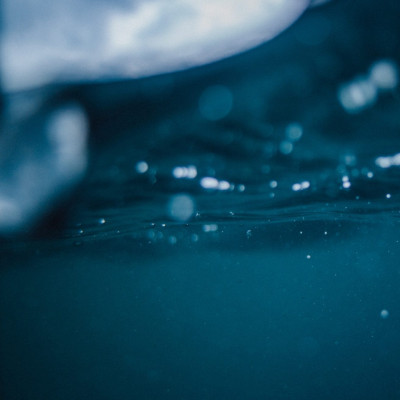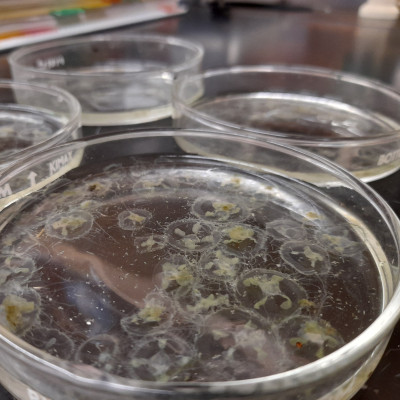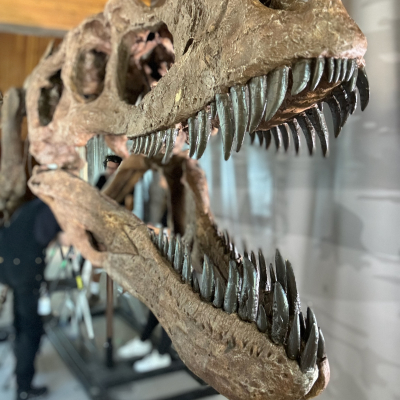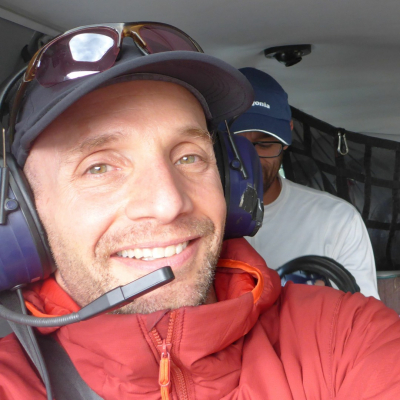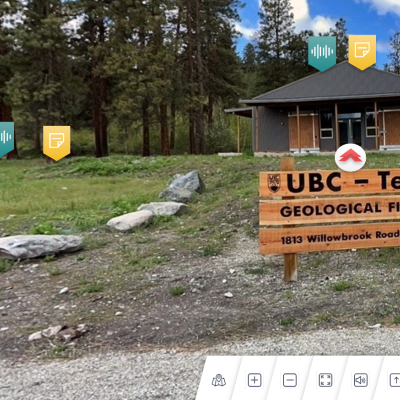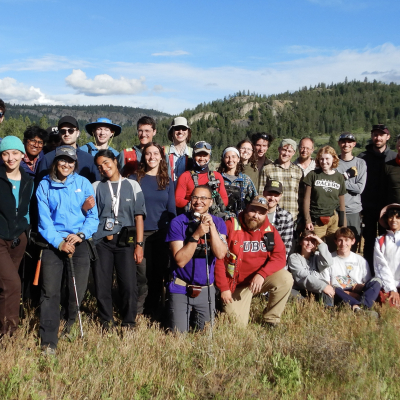News
Stay up-to-date with what's happening in EOAS
Our oceans are choking. What can we learn from ancient deoxygenation events?
During the lifetime of most of UBC’s tenured faculty, the oceans have lost more than 2% of their oxygen content and are projected to lose another 10% during the coming century. As water temperatures rise with climate change, oxygen becomes less soluble and is outgassed from the oceans. Around the world the range of anoxic waters, areas severely depleted of oxygen, are spreading and have quadrupled in volume since the 1960s. These anoxic areas, or ‘dead zones’, are associated with massive die-offs of marine life. To gain greater understanding of the fate of our oceans today, researchers are turning to deoxygenation events of the past.
Last week, new research by UBC graduate Kohen Bauer, supervised by Sean Crowe of the Department of Earth Oceans and Atmospheric Science, examined a widespread ocean deoxygenation event that occurred ~120 million years ago during the early Cretaceous period. Their research ‘A climate threshold for ocean deoxygenation during the early Cretaceous’ published in Nature details how a volcanic event increased atmospheric CO2 concentrations enough to tip climate thresholds and induce rapid warming and corresponding ocean deoxygenation. Ocean redox chemistry of that time, preserved in rock cores the team was able to analyze, reveals that it took up to a million years for the Earth system to recover. The ocean was persistently anoxic until silicate weathering gradually brought pCO2 levels down enough that the climate crossed back over the critical threshold for ocean oxygenation. Silicate weathering removes carbon from the atmosphere and increases under warmer temperatures, acting as a negative feedback to climate warming. However, it is still a very slow process, especially compared with CO2 injection rates due to volcanic events or human emissions.
The implication of this new research is that once ocean anoxia is onset recovery will be an incredibly slow process if relying on natural carbon sinks. The research suggests the critical climate threshold of the past was surpassed when pCO2 levels reached 2,000 ppm, five times today’s pCO2 levels, implying there is still some time to act before we reach the same turning point.
Click here to read the original research article.
EOAS Researchers Investigate Invasive Jellyfish Multiplying by the Thousands in B.C. Waters
A recent study done by Dr. Florian Lüskow and Dr. Evgeny Pakhomov from the Department of Earth, Ocean and Atmospheric Sciences (EOAS) and Institute for the Oceans and Fisheries (IOF), University of British Columbia (UBC), revealed the growing presence of the invasive peach blossom jellyfish in British Columbia (B.C.) waters, marking its furthest northern reach in North America. Read the UBC News article: Thousands of jellyfish clones are multiplying in B.C. lakes
The jellyfish, an introduced jellyfish species from China, has been reported with 85 sightings in BC in the last 34 years. However, Dr. Lüskow and Dr. Pakhomov predicted about 80 sightings for this decade alone and in more locations than currently observed as climate change warms the freshwater bodies of B.C. “If climate change leads to freshwater temperature increases across B.C., we will likely see wider spread. Modelling indicates that even Alaskan reservoirs may potentially see invasion,” said Dr. Pakhomov.
Though harmless to humans, this jellyfish's ecological impact on indigenous species is largely unknown. A silver lining is that only genetically identical male jellyfish have been found, meaning the species cannot reproduce sexually, limiting its ability to adapt to new environments.
Dr. Lüskow and Dr. Pakhomov plan to map the peach blossom jellyfish's actual distribution and better quantify its impact on freshwater ecosystems using environmental DNA. They would also like to know wherever the jellyfish occur, so if you spot a peach blossom jellyfish, feel free to submit a report to iNaturalist, the Invasive Species Council of BC, or to them directly.
Life at the Edge - The Pacific Museum of Earth's newest permanent exhibit
Scenes from the Late Cretaceous, the era of the dinosaurs, have come back to life within the Wheaton Precious Metals Atrium of the Earth Sciences Building (ESB) on the University of British Columbia campus. The new exhibit, Life at the Edge, curated by the Pacific Museum of Earth takes visitors back 75 million years to life at the edge of Earth’s fifth and most recent mass extinction event. Visitors to ESB can see a Daspletosaurus, an ancestor of the iconic T-Rex, chasing down a smaller carnivorous raptor, the Dromaeosaurus.
The exhibit has been designed to provoke thoughts on the precarious, yet resilient nature of life on Earth. Similar to the dinosaurs of the Late Cretaceous, we now face rapid climate change that many predict will bring us to the edge of the 6th mass extinction event. While the exhibit draws parallels between the current Anthropocene and Late Cretaceous, it also highlights important differences. The 5th mass extinction event at the end of the Late Cretaceous was initiated by unstoppable natural disasters. Whereas current increasing extinction rates are due to anthropogenic carbon emissions, land use change like deforestation, and resource extraction. While we may not be able to prevent all the consequences of climate change, we still have the power to adjust our activities to minimize consequences and adapt to change. The exhibit curators hope by highlighting these differences, visitors will feel empowered to initiate conversations within their own communities and take actions where they can.
The exhibit will open to the public on July 2. In the meantime, children at the University of British Columbia’s daycare program had an exclusive sneak peek of the dinosaurs as fossil articulators assembled the fossil casts. Their visit was covered by Vancouver CTV News. Several other media outlets have been quick to cover the new exhibit that hosts the first and only tyrannosaur on UBC’s campus. See below for a full list of Life on the Edge media coverage. Huge thanks to Wheaton Precious Metals whose generous gift made this new exhibit come to life.
Media coverage:
1. CTV News
2. CTV News Vancouver (9:50 mark)
3. Glacier Media via Vancouver is Awesome, Burnaby Now, Richmond News, Tri-City News, New Westminster Record, North Shore News, Squamish Chief, Delta Optimist, Times Colonist, Coast Reporter
4. Vancouver Sun via MSN
Mark Jellinek receives the 2024 Konrad Adenauer Research Award
Congratulations to Prof. Mark Jellinek, who has been honored with the 2024 Konrad Adenauer Research Award by the Alexander von Humboldt Foundation. Professor Jellinek, an EOAS geophysicist, is recognized for his pioneering work on magmatic and volcanic processes, climate change, and geodynamics. This prestigious award celebrates his significant contributions to Earth system science and his efforts in strengthening academic and cultural ties between Canada and Germany. During the tenure of the Konrad Adenauer Research Award, Prof Jellinek will collaborate with Eberhard Bodenschatz, physicist and director of the Max Planck Institute for Dynamics and Self-Organization. Each year the award, valued at 60,000 euros, is given to one internationally recognized Canadian researcher. Congratulations again to Prof. Mark Jellinek for receiving this year’s award.
Takes a virtual tour through the field station!
Check out our virtual tour (https://app.lapentor.com/sphere/teck) through the UBC – Teck Geological Field Station near the town of Oliver in the Okanagan Valley in British Columbia, Canada!
The virtual tour was created by Cynthia Liu in 2022, who was an undergraduate student at the time. It was funded by the Skylight Development Grant (including EOAS matching funds) and the Earth Science Experiential and Indigenous Learning Initiative (EaSEIL) supported by the UBC Teaching and Learning Enhancement Fund and EOAS Department Funds.
Dr. Laura Lukes (Assistant Professor at EOAS; Project lead & manager, research and evaluation of the EaSEIL project) believes that the virtual tour provides students with an opportunity to tour the field station virtually and helps them prepare for learning by reducing the uncertainty associated with going to a new environment. By knowing what washroom facilities, sleeping accommodations, etc. will be like, stress levels can be reduced and the students can focus their attention and energy on learning the content.
The virtual tour has been used by instructors of several courses, including EOSC328, GEOS309, and CONS451, to help students prepare for field course experiences that involve staying at the field station.
“The virtual tour of the UBC – Teck Geological Field Station plays an important role in preparing our students for what to expect during the course. The field station is their “home” for three weeks and the virtual tour allows the students to remotely inspect every aspect of the field station, from their Weatherhaven shelters where they sleep to the washroom/shower facilities, to the main building where they work and eat, to the kitchen area, and also the general environment outdoors. We look forward to using the virtual tour each year going ahead.” –Dr. James Scoates, Professor, Department of Earth, Ocean and Atmospheric Sciences, Instructor for EOSC328
“The field station is the shared home for students and instructors for up to three weeks for EOSC 328 Field Geology. The virtual tour is a great introduction to the space in which students and instructors will be living and working. I have used the virtual tour to introduce students to the field station before they arrive on site. With the camp now in regular operation, I anticipate that the tour will be used and appreciated by both UBC and external users. I am extremely grateful to the EaSEIL team for putting together this much-needed resource and for TELF and Skylight for funding this work among other projects that EaSEIL is undertaking.” –Dr. Joel Saylor, Associate Professor, Department of Earth, Ocean and Atmospheric Sciences, Instructor for EOSC328
“The field station VR is a really nice, simply designed closer-look at the field station. It has been really helpful in my own course for preparing students in advance for their living facilities and the field station environment, orienting students to the place. Nifty pop-up tips on accessibility features, and even how to approach or prepare for a day’s outing, were a plus.” –Dr. Nina Hewitt, Associate Professor of Teaching, Department of Geography at UBC, Instructor for GEOS309
“I really appreciated having the virtual tour available for our students. We view the tour together in class the week before the trip, and they enjoy seeing where they’ll be staying. They have a lot to prepare before embarking on a field trip, and knowing exactly what to expect at the station allows them to plan accordingly.” –Dr. Nolan Bett, Lecturer, Department of Forest and Conservation Sciences at UBC, Instructor for CONS 451
“It’s an absolute pleasure to see the UBC Teck Geological Field Station documented by this virtual tour. It captures the beauty of the area while providing a useful orientation to this professional and well-equipped field station, including notes on what to expect during field school. All that’s missing is the native plant garden in the front, the resident quails, and the amazing students, staff, and faculty that help make these field schools safe, supportive, and unforgettable experiences.” –Dr. Warren Cardinal-McTeague, Assistant Professor, Department of Forest and Conservation Sciences at UBC, Instructor for CONS 451
Okanagan Geology Field School: Three Weeks of Successful Mapping


